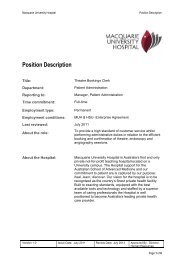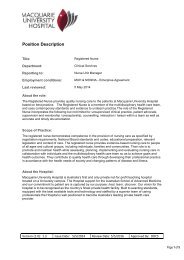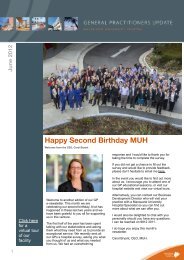Plenary Oral Presentations - Macquarie University Hospital
Plenary Oral Presentations - Macquarie University Hospital
Plenary Oral Presentations - Macquarie University Hospital
Create successful ePaper yourself
Turn your PDF publications into a flip-book with our unique Google optimized e-Paper software.
16 th International Meeting of the Leksell Gamma Knife ® SocietyMarch 2012, Sydney, AustraliaMA-280Stereotactic radiosurgery of brain metastases in elderlypatients: the cleveland clinic experience1Manmeet Ahluwalia, 1 Neda Hashemi-Sadraei, 2 John Suh, 1 Sam Chao, 1 Lilyana Angelov,1Robert Weil, 1 Michael Vogelbaum, 3 Paul Elson, 1 Gene Barnett1Burkhardt Brain Tumor and Neuro-Oncology Center, Cleveland Clinic2Taussig Cancer Institute, Cleveland Clinic3Quantitative Health Sciences, Cleveland ClinicObjective: Elderly patients often suffer from cerebrovascular impairment. Whole brain radiotherapy(WBRT) can cause vascular damage and enhances the risk of dementia. For patients with a limitednumber of brain metastases (BM) stereotactic radiosurgery (SRS) is promising alternative. This studywas designed to evaluate the therapeutic effect of SRS in patients aged ≥70 years who presented withBM.Methods: The IRB-approved Cleveland Clinic Brain Tumor and Neuro-Oncology Center’s databasewas used to identify patients with BM who were ≥70 years at the time of diagnosis of BM and weretreated with SRS between 8/2000 and 12/2009. Multivariable analysis was conducted to identifyindependent predictors of survival using a Cox proportional hazards model and a stepwise selectionalgorithm with p=0.10 and p=0.05 as criteria for entry and retention.Results: 173 BM patients with a median age of 75 years (range 70-87, 64% male) were included.Most patients had either lung cancer (55%, 95/173) or kidney cancer (16%, 28/173) primaries.Median time between diagnosis of the primary cancer and BM was 10.3 months (0-309.6 months).Forty-six percent (79/173) of patients had multiple BM and 57% (99/173) had extra-cranial metastasesat the time BM was diagnosed. Median overall survival (OS) was 5.5 months from the time of SRS(95% CI, 4.4-7.2 months). Cause of death was extracranial tumor progression in 35% of the patients,cranial tumor progression in only 3%, both cranial and extracranial tumor progression in 9%, andthe cause of death was unknown in 53%.Conclusions: In multivariable analysis, performance status, the interval from diagnosis of the primarycancer to BM, WBRT prior to SRS and presence of extracranial metastasis were all identified asindependent predictors of OS. SRS is a well tolerated and effective treatment for elderly patients.50
















